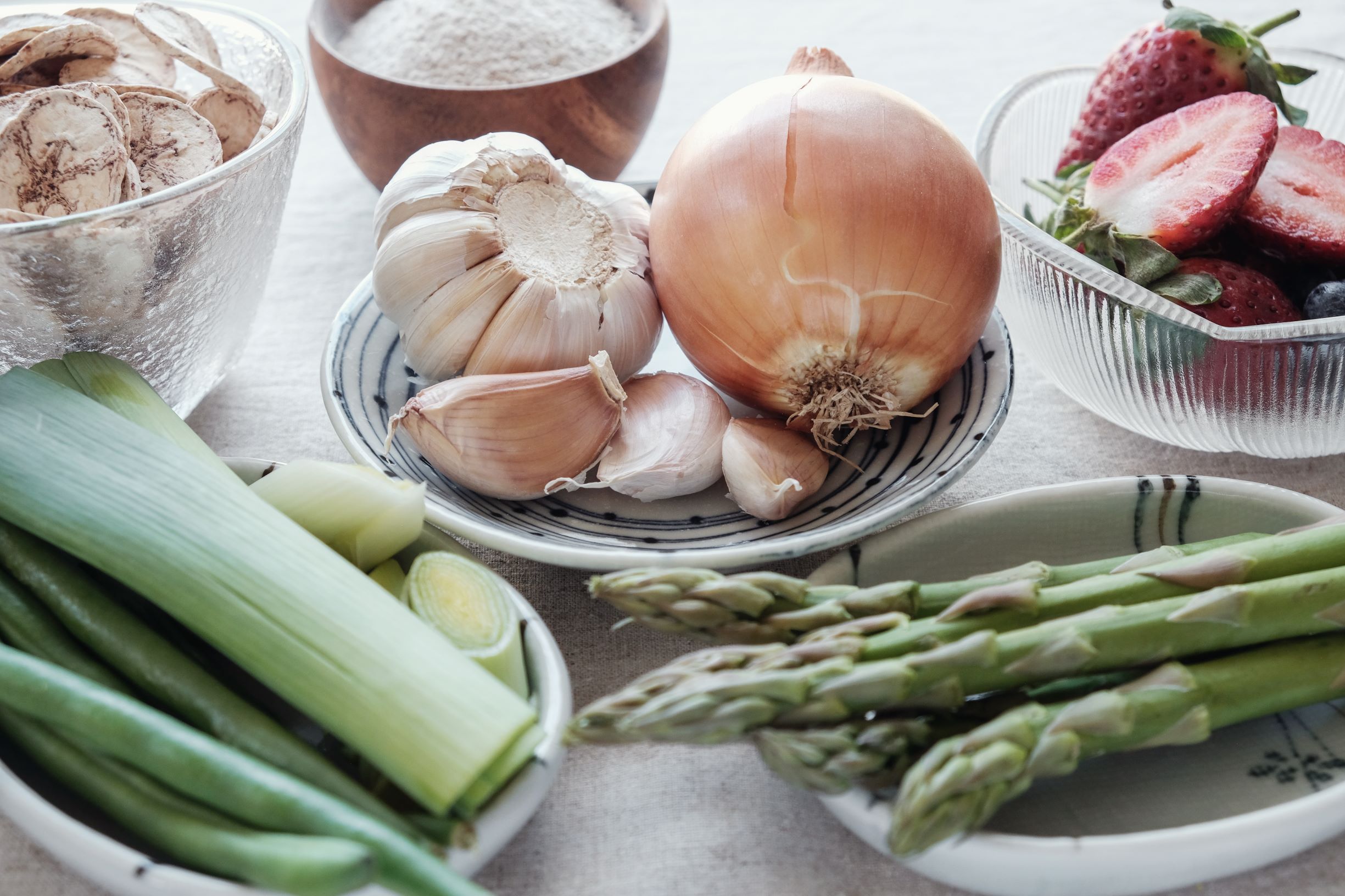Let's stay in touch
Keep in touch with us and stay up to date with latest in the world of healthcare and gut health!
First. Let’s start with the Difference Between Prebiotics And Probiotics
Have you ever wondered about the difference between probiotics and prebiotics? Although they have very similar names, they play different roles when it comes to your health.
Let’s take a closer look at prebiotics, probiotics, and which is more important for your gut.
What are probiotics?
According to the World Health Organisation, probiotics are microbes that provide health benefits when we consume enough of them.
Fermented foods are often referred to as probiotic foods, as they contain potentially beneficial strains. Fermented foods include:
Probiotics also come in the form of supplements – typically in the form of a capsule, tablet or powder.
However, it’s important to remember that not all probiotic supplements are equal or useful for your health concerns. Different strains of bacteria offer different health benefits, and more strains doesn’t necessarily mean it will be more effective.
There are also some people who should not take a probiotic without consulting with a healthcare practitioner. For example, someone with small intestinal bacterial overgrowth (SIBO) may worsen their symptoms if they take a probiotic supplement.
So what are prebiotics?
Prebiotics are a group of dietary fibres that act as food for specific species of bacteria.
When you consume prebiotics, the friendly microbes in your gut take them and use them as fuel. They can also convert it into a short-chain fatty acid called butyrate. Butyrate can help to reduce inflammation, as well as repairing and enhancing the gut lining.
Foods that contain prebiotic fibres include:
Like probiotics, you can also take prebiotics in the form of a supplement. A supplement may contain one or more types of prebiotic fibres, and it may also have other ingredients depending on what it has been designed to help with.
Why are prebiotics so important?
Why? Because prebiotics help to support the trillions of microbes that already live in your gut.
All of the microbes that live in the digestive tract are collectively known as the gut microbiome. The research into the gut microbiome is still in the early stages. But what is known is that the greater the diversity of beneficial microbes living there, the better.
Research has found that reducing your carbohydrate (and fibre) intake for even one day can significantly affect your gut microbiome. A low intake of fibre reduces the abundance of beneficial strains and increases the abundance of potentially harmful strains.
On the other hand, eating more fibre can change the gut microbiome for the better by increasing beneficial strains.
The foods that contain prebiotic fibres also contain plenty of nutrients that support your gut health. This can include antioxidants, vitamins and minerals.
So by consuming prebiotics daily, you can support a good balance and diversity in your gut.
Can it still be beneficial to consume probiotic and fermented foods as part as a balanced diet? Absolutely. But they aren’t a requirement for a healthy gut.
Should you take a prebiotic supplement?
In an ideal world, you would get all of the prebiotic fibres you need from your diet. But life can be busy, and no one eats a perfect diet all the time! That’s why it can be a good idea to consider a prebiotic supplement to support your gut health.
Looking at taking a prebiotic supplement? Our Gut Relief is a science-based formulation that helps to maintain gut integrity and function. It contains prebiotics such as pectin and guar gum, as well as nutrients and herbs that support gut health. You can learn more about Gut Relief here.


SAMe is a compound best known for its antidepressant action. In this article, we seek to touch on the significant body of evidence that supports


Ingredients (4 serves):• 500g carrots, grated. (Ideally organic)• ½ red onion, finely sliced• Zest & juice of 1 lemon• 2 tsp toasted cumin seeds• 2cm




观看由创办人 Ian Brighthope教授为大家回顾了 Nutrition Care 的历史,並向大家保证将会继续坚持纯自然和更专业的理念,为世界人们提供高质量的保健品。


2018年4月26日,Nutrition Care在墨尔本举办庆典庆祝品牌创立40周年。 Nutrition Care是澳洲著名的保健品生产商,其创立于1978年,40年来一直致力于减少药品的使用。而此次40周年庆典的主题——自然更专业,也是他们长久以来希望传达给消费者的理念。26日下午1点半,Nutrition Care的40周年庆在墨尔本的Crown正式拉开序幕。 (著名主持人李维嘉,品牌创始人Ian Brighthope,澳洲名模Lauren Vickers) 此次庆典上,Nutrition


5月13日,Nutrition Care首次冠名全澳大学生华语辩论赛——NC纽新宝杯决赛于墨尔本市政厅成功举行! 本次辩论赛由澳洲著名保健品品牌NC纽新宝独家冠名,活动到场嘉宾有中国驻墨尔本总领事馆教育组杨智勇领事,本次评委阵容亦相当强大,其中就包括《奇葩说》著名辩手陈铭与胡渐彪 。 决赛双方分别是莫纳什大学中文辩论社和墨尔本大学中华辩论社,双方就【消费主义是当代灵魂的良药还是毒药】这一辩题,站在不同的角度,深度剖析。 最终,莫纳什大学代表队的表现获得了评委们的一致青睐,夺得本届全澳辩论赛中冠军。 比赛结束后,胡渐彪评委深入浅出解读【良药】【毒药】的定义,给辩手和台下观众们带来更深层次的思考。徐卓阳评委更是以赞助商NC纽新宝在台上的养胃粉为例,幽默而又直观地对话题进行了概括,通俗易懂,却又发人深思。Nutrition Care品牌创始人Ian Brighthope虽不能亲自到场,但特意录制了一段祝贺视频给参赛选手们。视频中Ian教授感谢选手们的付出,在母亲节这样特殊的日子里,他提醒远离家人的留学生们,要注意自己的身体健康,因为健康对他们而言,是在异乡追逐人生梦想最重要的急事之一。 最後,NC纽新宝为嘉宾、评委们以及每一位前来参加活动的观众准备了养胃小礼物,让大家在观 看辩论赛时感到暖心暖胃。
Keep in touch with us and stay up to date with latest in the world of healthcare and gut health!
| Cookie | Duration | Description |
|---|---|---|
| cookielawinfo-checkbox-analytics | 11 months | This cookie is set by GDPR Cookie Consent plugin. The cookie is used to store the user consent for the cookies in the category "Analytics". |
| cookielawinfo-checkbox-functional | 11 months | The cookie is set by GDPR cookie consent to record the user consent for the cookies in the category "Functional". |
| cookielawinfo-checkbox-necessary | 11 months | This cookie is set by GDPR Cookie Consent plugin. The cookies is used to store the user consent for the cookies in the category "Necessary". |
| cookielawinfo-checkbox-others | 11 months | This cookie is set by GDPR Cookie Consent plugin. The cookie is used to store the user consent for the cookies in the category "Other. |
| cookielawinfo-checkbox-performance | 11 months | This cookie is set by GDPR Cookie Consent plugin. The cookie is used to store the user consent for the cookies in the category "Performance". |
| viewed_cookie_policy | 11 months | The cookie is set by the GDPR Cookie Consent plugin and is used to store whether or not user has consented to the use of cookies. It does not store any personal data. |




Get free shipping on your first order* when you enter your details below.
*A minimum purchase of $25 is required. Always read the labeland follow the directions for use.